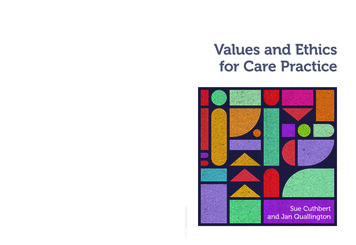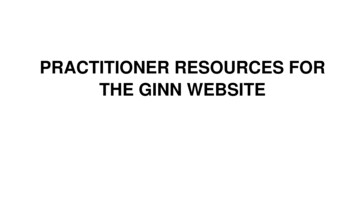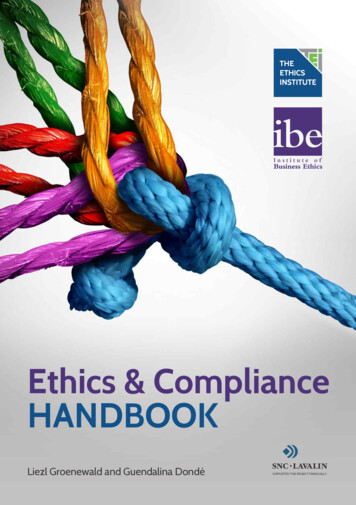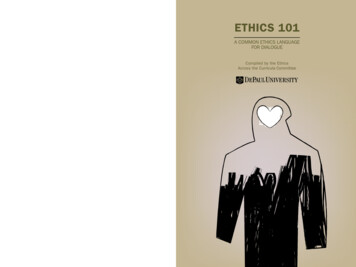
Transcription
Values and ethics are integral to the provision, practice and delivery of patientcentred health and social care. This book introduces readers to these conceptsand uses activities and case studies to help readers apply the theory in theircare practice.Values and Ethics for Care Practice encourages students to reflect on topics such as: Compassion in care Rights, equality and anti-discriminatory practice Respect and dignity Autonomy Trust, confidentiality and truth-telling Protection from harm and promotion of independence Accountability and responsibilityThe patient perspective underpins this book, helping readers to develop their owncompassionate practice.Values and Ethics for Care PracticeValues and Ethicsfor Care PracticeValues and Ethicsfor Care PracticeThe book is ideal for pre-registration nursing students studying ethics modules, andit is suitable for students following Health Care Foundation Degree programmes anda wide variety of other health and social care courses.Cuthbert & QuallingtonISBN s cover 244x172 17mm.indd 1-3Sue Cuthbertand Jan Quallington9 781908 62530410/05/2017 10:28
Values and Ethicsfor Care Practice
OTHER TITLES FROM 90862515197819086253289781908625281For more details see www.lanternpublishing.com
Values and Ethicsfor Care PracticeSue Cuthbert & Jan QuallingtonUniversity of Worcester
ISBN 9781908625304First published 2017This book is an updated and significantly expanded version of Values for Care Practicepublished by Reflect Press Ltd in 2008 (ISBN 9781906052058)Lantern Publishing Limited, The Old Hayloft, Vantage Business Park, Bloxham Rd, Banbury,OX16 9UX, UKwww.lanternpublishing.com 2017, Sue Cuthbert and Jan QuallingtonThe right of Sue Cuthbert and Jan Quallington to be identified as authors of this work hasbeen asserted by them in accordance with the Copyright, Designs and Patents Act 1988.www.cla.co.ukBritish Library Cataloguing in Publication DataA catalogue record for this book is available from the British Library.The authors and publisher have made every attempt to ensure the content of this book is upto date and accurate. However, healthcare knowledge and information is changing all thetime so the reader is advised to double-check any information in this text on drug usage,treatment procedures, the use of equipment, etc. to confirm that it complies with the latestsafety recommendations, standards of practice and legislation, as well as local Trust policiesand procedures. Students are advised to check with their tutor and/or mentor before carryingout any of the procedures in this textbook.Typeset by Medlar Publishing Solutions Pvt Ltd, IndiaCover design by Andrew Magee Design LtdPrinted in the UKDistributed by NBN International, 10 Thornbury Rd, Plymouth, PL6 7PP, UK
CONTENTSAbout the authorsviiPrologue: Anne’s storyix1Introduction to values for care practice12Introduction to ethics for care practice193Compassion and care334Rights, equality and anti-discriminatory practice595Respect and dignity816Autonomy and the principle of respect for autonomy1197Trust, confidentiality and truth-telling1558Protection from harm and promoting independence1879Values, accountability and responsibility21110 Conclusion: value-based reflection229References239Index259v
ABOUT THE AUTHORSDr Sue Cuthbert is the Head of Collaborative Programmes at the University ofWorcester.Sue qualified as an RGN and practised in care of the older adult and in women’s healthsettings. Since moving into higher education in the 1990s, she has taught values andethics in both nurse and midwifery education, as well as in applied health courses forundergraduate and postgraduate students. She now oversees the quality and deliveryof a range of collaborative course developments with partner organisations, includingFoundation Degrees in health and care.She has an MA in Medical Ethics, where her research focused on reproductive choice,rights to healthcare, resource allocation and access to infertility treatment. She hassince completed a Doctorate in Medical Ethics, also at Keele University. Her doctoralresearch examined the notion of choice in childbirth and competing models ofautonomy in midwifery care, advocating for a pluralist view of values important towomen’s personal choices and decision-making, but where autonomy in midwiferypractice is viewed through a social-relational lens.Sue is also an informal family carer who has supported and cared for both her parentsthrough the progressive effects of Alzheimer’s and vascular dementia, and has thereforeseen health and social care, both good and less satisfactory, from ‘the other side’. Thishas further reinforced her conviction in the importance of practising values-based careand the centrality of respect, dignity and compassion for good holistic care.Dr Jan Quallington is Head of the Institute of Health and Society at the Universityof Worcester.Jan qualified as an RGN (Adult) and undertook specialist education in cardiothoracicnursing. Her clinical practice was in acute medicine, coronary care and intensive care.Since moving into education in a University setting Jan has studied for an MA inMedical Ethics and Law and has gained a Doctorate in Medical Ethics from KeeleUniversity. This focus on ethics has shaped the way that she thinks about practice.vii
Jan is passionate about educating and developing a workforce that will be effectivelyprepared to provide values-based, compassionate care. She believes that practitioners ofthe future must be confident to work collaboratively within a multiprofessional context,reflecting on and challenging with a view to leading, and enhancing practice.Jan has undertaken a number of roles in higher education and has taught and learnedfrom students across the health and social care spectrum. She currently leads a largemultiprofessional team to deliver a wide range of health and social care education inpartnership with health and social care providers and service users.Jan has written on Ethical Reflection and on Leadership in health and social care.viii
05RESPECT AND DIGNITYLE A RNING OUTCOMES:In this chapter you will: define respect and dignity and consider what it means to berespectful and to have respect for others identify the moral justification for a duty of respect for persons andconsider the notion of personhood discuss duties and rules arising from the value of respect for personsand their implications for practice explore the concepts of dignity and privacy in relation to practice reflect on care strategies that promote respect and dignity.INTRODUCTIONPeople value their dignity. While they may not identify exactly what this means, theyknow when it has been compromised or threatened. People are particularly vulnerableto loss of dignity in healthcare as their care needs bring what is normally private intothe public realm and require the intervention of relative strangers. Dignity is closelyassociated with the values of respect (of self and others), respect for persons and respectfor a person’s autonomy. We will discuss autonomy in detail in Chapter 6.Recognition of your humanity through respect for you as a person is fundamental tomaintaining your dignity and to your feelings of self-esteem and self-worth. Thesenotions of respect and dignity have attracted considerable attention in recent years,both in theory and in practice. They are at the forefront of government policy and arereflected in a range of government reports, particularly in responses to inquiries intoincidents of poor and inhumane care (DH, 2014; 2012; 2012a and b; DH and Poulter,2013; Francis, 2013).81
CHAPTER 5Professional and policy expectations of respect and dignityRespecting people and their dignity are fundamental expectations for you as apractitioner and core values for all health and care services, reflected in nationalstandards and strategies throughout the UK.Respect and dignity are: principal values in the NHS Constitution (DH, 2015a, p.5) central to the vision and strategy for nursing, midwifery and care staff (DH andNHS Commissioning Board, 2012c) fundamental aspects of care in the Essence of Care 2010 benchmark (DH, 2010b) central to the mental health strategy, No Health without Mental Health (DH, 2011a) featured in the fundamental standards in ‘The Health and Social Care Act 2008(Regulated Activities) Regulations 2014’ (DH, 2014a, b, and c) key values in the National Occupational Standards for Health and Social Care(2013) (see Box 5.1) integral to the Core Competences for Healthcare Support Workers and Adult SocialCare Workers in England (Skills for Care and Skills for Health, 2013b) reinforced in the Care Certificate Standards for healthcare support workers(HCSW) and adult social care workers (ASCW) (Health Education England,Skills for Care and Skills for Health, 2015).BOX5.1The National Occupational Standards for Health and Social Care (2013)These identify the principles and values that underpin the rights that individuals(children, young people and adults) and key people have: to be treated as an individual to be treated equally and not be discriminated against to be respected to have privacy to be treated in a dignified way to be protected from danger and harm to be supported and cared for in a way that meets their needs, takes account oftheir choices and also protects them to communicate using their preferred methods of communication and language to access information about themselves.See for example: National Occupational Standard (SCDHSC0234) Uphold the Rights of Individuals (Skills forCare and Development, March 2012) available at df(accessed 14 December 2016)Health and social care professions view respect as fundamental to the healthcarerelationship, both with patients, service users and their families as well as respecting82
RESPECT AND DIGNITYeach other as members of the care team. Respecting ‘dignity, humanity and equality’ isone of the key Principles of Nursing Practice identified by the Royal College of Nursing(RCN) ( Jackson and Irwin, 2011). Similarly, Skills for Care identify seven coreprinciples essential to supporting dignity in adult social care (Skills for Care, 2013).The concepts of respect, individual autonomy and preservation of dignity are alsofundamental to many codes of practice and professional conduct for health and carepractitioners such as the Code of Conduct for Healthcare Support Workers and Adult SocialCare Workers in England (Skills for Care and Skills for Health, 2013a) and the Standardsof Proficiency for Social Workers in England (Health and Care Professions Council, 2017).The Code: professional standards of practice and behaviour for nurses and midwives(NMC, 2015) puts ‘prioritising the interests of people’ first. This expects practitionersto treat people as individuals and uphold their dignity, listen and respond to people’spreferences and concerns, make sure that people’s physical, social and psychologicalneeds are assessed and responded to, act in the best interests of people at all times andrespect people’s right to privacy and confidentiality (NMC, 2015, pp.2–6).The right to be treated with respect and dignity is also enshrined in law, with variouspieces of legislation supporting this legal right, most significantly the Human RightsAct (1998) and the Equality Act (2010) but also laws associated with mental capacity,data protection and freedom of information.Despite all this, incidents of poor care continue, and certain groups of patients andservice users have been particularly vulnerable to disrespect and undignified careresulting in significant harms and loss of self-worth and self-esteem. These includeolder people, people with learning disabilities, and those with dementia or mental healthproblems. For example, the National Service Framework (NSF) for Older People (DH,2001a) aimed to address the widespread infringement of dignity of older people. Yetrespect and dignity were still found lacking in the care of older people a decade later(Parliamentary and Health Service Ombudsman, 2011).Similarly, Valuing People: a new strategy for learning disability for the 21st century (DH, 2001b)emphasised the importance of placing the individual with learning disabilities at the centreof care. But respect, dignity and person-centred care and support for people with learningdisabilities, their families and carers were still found wanting and their importance reemphasised in Valuing People Now (DH, 2009) and Transforming Care: a national responseto Winterbourne View Hospital (DH, 2012b). However, the values of respect for persons anddignity are not exclusive to particular service user groups. They are relevant to whoever youwill meet in your practice, including staff and other carers, and in your everyday life.Despite many references to the values of respect and dignity in health and socialcare policy, codes and guidelines, assumptions are made about practitioners sharing acommon understanding of these concepts. As dilemmas in care indicate, these valuesare more complex in their meaning and their application than professional rules forpractice alone can convey.83
CHAPTER 5This chapter aims to develop a deeper understanding of the moral values of respect forpersons, dignity and privacy and explores their centrality to good health and social care.It encourages reflection on the attitudes and behaviours that impact on an individual’sdignity and sense of self-worth and supports development of care strategies thatpromote respect for persons and dignity-enhancing care.WHAT DO WE MEAN WHEN WE USE THE TERMS ‘RESPECT’AND ‘RESPECT FOR PERSONS’?Thinking about respect as a valueRespect is important to daily life, although this is often equated with simply respectingthe authority of others, such as people in power, the law or religion. The word ‘respect’has become commonplace in everyday language, both in the general public domain(for example, respecting nature and the environment, respect for human life in debatesabout abortion, respecting cultural difference and diversity) and in political debate. Forexample, the UK coalition government of 2010–15 espoused a commitment to buildinga fairer society and to support social action to change culture and attitudes through the‘Equality Strategy’, with the aim of ‘building respect for all, tackling discrimination,hate crime and violence’ (HM Government, 2010).Respect for self and others is a fundamental element of living together in a society.However, there are many ways to think about and use the term ‘respect’ and it mayhave different meanings to different people and according to the context in which it isused, such as ‘respect me for who I am’ or ‘respect my authority’. Both of these demandacknowledgement, recognition and consideration by others, although the reason forgiving (or owing) such respect is different.AC T I V I T Y5.1ReflectionHave you ever experienced a time when you felt that you were not respectedor felt undervalued? This may have been, for example, in a family or personalrelationship, in an interaction with someone you know or with a stranger, or in awork environment. Describe this significant incident. Where were you? Who was involved? Werethere any specific circumstances? Then think about and write down:How did this make you feel?Why did you feel this way?What did you do?84
RESPECT AND DIGNITYYou may have identified a number of feelings, such as anger, upset, sadness, disbelief,concern, being belittled. It may have been harder to identify exactly why you felt thisway; you may have felt that it just wasn’t ‘fair’ or ‘right’. However, it is important as areflective practitioner that you keep asking yourself why you believe something is rightor wrong or should or should not be the way it is. You may have said that it wasdisrespectful of you as an individual. This idea of respect and respect for persons needsfurther exploration.Defining respectThere are various ways to define respect. The term ‘respect’ can refer simply to abehaviour that avoids violating or interfering with a boundary or rule; for example, adriver respecting a speed limit or a smoker refraining from smoking in public places.Respect can also involve an attitude or feeling, as when we speak of having respect foranother person. Practitioners in health and care are expected to respect boundariesor rules, such as the law associated with consent to treatment, policies, competenciesfor practice and the rules outlined in codes of conduct. However, what we are mostconcerned about here are the values and attitudes associated with ‘respect for persons’and their influence on a practitioner’s behaviours and practice.AC T I V I T Y5.2Defining respect1. Think about and write down your definition of ‘respect’.2. If you find this difficult, start a concept map showing different words, phrasesand ideas that come to mind when you think about ‘respect’ (you may wellidentify many more words and ideas than indicated by the six arrows below).[Text][Text][Text]Respect3. Look up ‘respect’ in a dictionary and add the definition to your ‘mind map’ (butremember a dictionary definition will only start to identify its meaning).4. Now talk to some relatives, friends and/or colleagues about their understandingof the term ‘respect’.5. Try rewriting your definition now.85
CHAPTER 5Respect in the health and care context can be simply defined as the recognition of theunconditional value of patients, service users, clients and carers as persons. This requiresboth a belief that persons should be valued and that your actions should reflect such a belief(Beach et al., 2007). Respect seen in this way necessarily involves respecting autonomybut this alone is not a sufficient understanding of respect for persons in care relationships.Respect can mean not only a symbolic recognition of status or social position but alsopaying proper attention to the ‘object’ of respect and acknowledgement of the value andworth of something or someone. Thus, being respectful reflects an individual’s: beliefs evaluative judgements commitments dispositions of attitude and behaviour towards the person who is being respected.AC T I V I T Y5.3Reflection Think of a situation where you feel that another person has been treatedwith disrespect. Identify what form/s of respect were disregarded. Was itsomeone’s authority or position that was ignored or undermined? Was it theattitude of a person towards another that seemed disrespectful? Were anyrules or boundaries broken? Was it a combination of some or all of thesefactors? Can you identify why the person was treated this way? In your view, how should this situation have been handled? What should havehappened?The principle of respect for personsAs children we are generally taught to respect significant others such as parents,elders, teachers and people ‘in authority’. As we get older, we may develop a deeperunderstanding of respectfulness and the value of respect for others, connected withtheir feelings, rights and differing opinions. We may have great respect for some peoplebased purely on a positive assessment of their merits or social standing and considerthem exemplary; we may lose respect for others, depending on our judgement ofwhether they are truly worthy of our respect. We may also come to believe that allpeople are worthy of respect, regardless of whether they display any merits, because oftheir humanity, as unique individuals and simply because they are persons.Respect for persons as persons should be distinguished from respect for persons inparticular roles or based only on the positive assessment of the merits of an individual.Respect for persons is not simply about ‘liking’ or even ‘agreeing with’ someone.Although it involves an emotional response, it is not merely about sentiment butrequires a corresponding disposition to respond and act respectfully towards the ‘object’86
RESPECT AND DIGNITYof respect, the person. Equally, respect is more than just respectful behaviour, becausesimply to behave in a way that appears respectful, without valuing that respect, isdeceitful. The idea of paying proper attention to the person central to your respectmeans trying to see the person clearly in their own right and through their own eyes;trying to identify their values, desires, strengths, wants and needs and not seeing themsolely through the filter of your own feelings and dispositions (Dillon, 2014).The motive behind your show of respect for another person is as morally importantas knowing how to act respectfully. For example, not using racially inappropriatelanguage while caring for an Asian family simply because you do not want to be caughtbreaching race discrimination laws is not sufficient motive to be considered respectful.In this case, your fear of legal recrimination is more about self-interest than the value ofrespect for others, even though on one level you are showing respect for the authorityof the law. The motive for your action should come from the value you attributed tothem as persons with equal rights to respect and because you believe all individuals areunique and valued members of society.Dillon (2014) identifies what he calls ‘care respect’, which‘ involves regarding the object [of respect] as having profound and perhapsunique value and so cherishing it, and perceiving it as fragile or calling for specialcare and so acting or forbearing to act out of felt benevolent concern for it.’(Dillon, 2014, p.7, Sect. 1.2)Thinking of respect as ‘care respect’ encompasses the belief that persons have a uniquevalue deserving of special concern and care.Harris (1985, p.193) adds, ‘having concern for the welfare of others’ as another essentialcomponent of respect for persons. Concern for the welfare of others may be mutuallycompatible with respect for autonomy (often associated with respect for persons),although many moral dilemmas in health and social care practice arise when thesetwo values come into conflict, as you will see when we talk about risk, protection fromharms and acting in a person’s best interests.BOX5.2Respect for personsThis at the very least requires: a belief in the value of persons as individuals and as members of society an obligation to respect individuals as human beings treating people in the manner in which you would expect to be treated showing consideration for another person’s feelings and interests an attitude demonstrating that you value another person.87
CHAPTER 5Many of the ordinary rules and judgements of common social morality (our ordinaryshared moral beliefs) presuppose respect for persons as a foundation of all other moralprinciples, duties and obligations. In this way, the principle of respect for persons can beconsidered to be universal and should not have any national, cultural, legal, or economicboundaries. This is evident in much of the discussion of values and ethics associatedwith health and social care, where respect for persons and the worth of all humanbeings is seen as an essential guiding principle that underpins all others (Banks, 2012;Beauchamp and Childress, 2013; Seedhouse, 2009). For example, if you act accordingto the principle that it is wrong to harm another then this will, in part, be based in youvaluing their humanity and them as a unique individual, with feelings and interests thatshould not be violated.THE MORAL DUTY OF RESPECT FOR PERSONSMuch of the contemporary discussion of respect for persons is credited to the workof an eighteenth-century German philosopher, Immanuel Kant, who put respect forpersons at the very centre of his deontological moral theory. His original writings arecomplex and open to misinterpretation but some of the key points from his work arerelevant to the value of respect for persons in care practice.Kant argued that all people are bearers of fundamental rights and that persons havean absolute dignity that is independent of rank or merit and must always be respected.Thus, persons have absolute value, unconditional worth and exist as ‘ends in themselves’,in contrast to things that are valuable merely as a means to an end or as objects ofaffection. This value is common to all people and is concerned not with being humanbeings in a genetic sense, but with our humanity and the associated possession of thespecial features that make us distinctively human. This includes the capacities of ‘reasonand freedom of will’, i.e. the ability for self-directed rational behaviour and to chooseand follow our own moral goals. We will come back to some of these ideas in thediscussion of respect for autonomy in Chapter 6.Kant stated his principle of respect for persons as a ‘categorical imperative’; an absoluterequirement that we should always act in ways that treat humanity as an end in itself,never merely or exclusively as a means to another person’s ends.Thinking about this statement, you should be able to recognise that there is somethingintuitively wrong in treating human beings as merely instruments to achieve our owngoals. An extreme example of this would be slavery. However, this does not totallyrule out using people for our own purposes and we do this on a regular basis. Forexample, when I employ a plumber to fix my central heating, I am using him as ameans to my own ends. What is important, however, is that I am not treating him88
RESPECT AND DIGNITYmerely as a means to my own ends because, in employing him, we both enter freelyinto a ‘contract’ (in this instance, involving payment). The plumber is able to makechoices as to whether or not he wants to do this work or something else, he caninfluence when he is available, how much it will cost, etc. The same can be said ofany person employed to provide a service, paid or voluntary, including care workers,as they have all chosen to enter into their role and with some purpose of their own.Conversely, a slave is treated as a means to someone else’s ends, they are not free tomake choices about how they live their life and their sole purpose is to fulfil anotherperson’s wishes and commands.One example of the notion of ‘using people as a means to an end’ in healthcareoccurs when human research subjects are recruited to participate in trials forthe testing of a new drug or treatment, as they are obviously being used for thepotential benefit of others. Some people may get involved for altruistic reasons;their contribution to improving treatments for others and society. Others will doit for their own benefits, including financial reward, or they may have both motives.In either case, they have not been used merely as a means to another’s ends; theyalso had a purpose to their involvement and a choice to participate or not. This ismorally permissible, provided they made their decision freely and that the necessaryconditions for informed choice and consent have been met, such as the provision ofsound information. These expectations for consent relate closely to the principle ofrespect for autonomy to be discussed in Chapter 6. There are rigorous guidelines forthe ethical approval and conduct of medical research, which up to 2016 includedthe Research Governance Framework for Health and Social Care (DH, 2005b).The Health Research Authority (HRA) will publish a new UK policy frameworkfor health and social care research following consultation in 2016 (HRA, 2016).However, the application of published rules and guidelines still depends on themoral integrity and values of the people conducting and participating in researchand on those that make judgements on the nature and moral imperative of theresearch itself in approving the research proposal.Due respect for humanityWhat Kant also required was not just a sense of respect for others but that, morallyspeaking, you should act with due respect for humanity. On this basis, you should fosteran attitude of due respect rather than simply a ‘feeling’ of respect. This is particularlypertinent to a value-based approach to caring for others. We owe persons respect simplybecause they are persons, regardless of whether we like them, they are useful to us or evenif they have wronged us. Think about the value of respect for persons as you considerCase study 5.1.89
CHAPTER 5C A SE S T UDY5.1Alfred in A & EGemma is a healthcare assistant. She usually works in a medical ward but she hasbeen sent to cover the evening shift in Accident and Emergency. Alfred, an elderlyman, is brought in by ambulance; he is unkempt and smells strongly of alcohol.His clothes are stained with urine. He is well-known to the locals; he is homelessand has been living on the streets for several years. Some passers-by called theambulance when they saw him fall down a small flight of steps. Following initialassessment, he has no serious injuries but he has grazes on his hands and a smallcut on his forehead. He is to be kept in overnight for observation. Staff usuallytake this opportunity to provide basic hygiene and clean clothes. Gemma is askedto wash Alfred’s hands and face and to stay with him until a registered nurse isavailable to suture the cut. However, he has become extremely vocal, is swearingat any member of staff that goes near him and he is disturbing other patients andrelatives. As she enters the cubicle, Alfred hurls verbal abuse at her and, when sheoffers to wash the blood from his hands and face and to get him some clean clothes,Alfred pushes her away forcefully.Gemma starts to think that she’s drawn the short straw. She doesn’t see why sheshould subject herself to Alfred’s vile language and abuse and if that’s the way hefeels and he doesn’t want helping, then why should she bother? It is Alfred’s choiceafter all. What are your initial feelings about this case? Should Alfred’s desire to be leftalone be respected? Provide a justificat
Values and ethics are integral to the provision, practice and delivery of patient-centred health and social care. This book introduces readers to these concepts and uses activities and case studies to help readers apply the theory in their care practice. Values and Ethics for Care Practice encourages students to reflect on topics such as:










